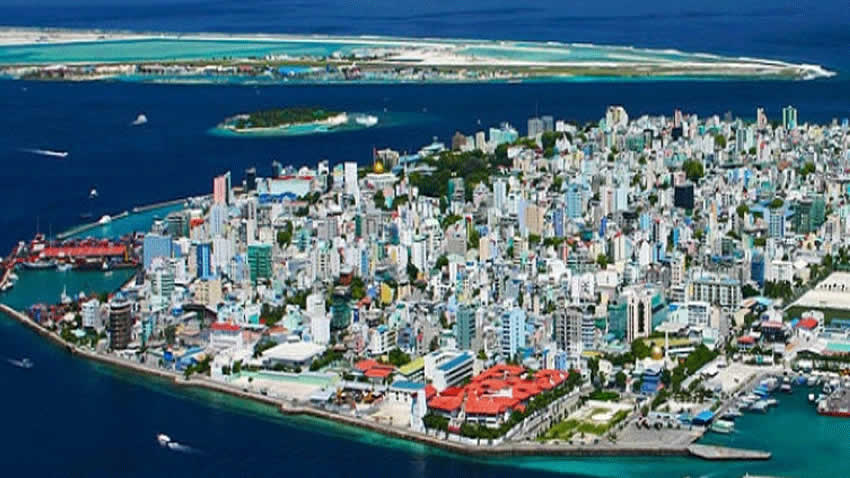|

Aerial view of Malé, the capital of Maldives. Malé is also
known as "King's Island." Photo: CrescentRating

ith all the
billion-peso projects in the planning stages by the Rodrigo Duterte administration,
financed by Communist China, Filipinos might take a cue from the Maldives and
warn President Duterte to slow down. That country was in the news recently
because of the sad and tragic death of a newlywed Filipino couple who drowned as
they honeymooned on one of their beaches.
Like the
Philippines, the Maldives is an archipelago. According to the Wikitravel
website, it is “a tropical paradise of pristine beaches” in “1,192 coral islands
grouped into 26 coral atolls (200 inhabited islands, plus 80 islands with
tourist resorts) in the Indian Ocean. They lie south-southwest of India and are
considered part of Southern Asia.”
Up until late
September 2018, the country was ruled by China-leaning strongman Abdulla Yameen
who won the presidency in 2013 by a razor-thin margin of just 6,000 votes. On
February of last year, he declared a state of emergency. According to The
Economist newspaper, in the process, Yameen “locked up two Supreme Court
justices, members of parliament and even his own half-brother.” The paper
further noted that: “his preparations for the presidential election on September
23rd appeared just as thorough. The most prominent leaders of the opposition
remained in jail or in exile. The government had showered voters with
pre-election goodies, such as waiving rent fines and trimming prison sentences.
The police went as far as to raid the opposition alliance’s headquarters the day
before the vote.”
But despite all
the effort to rig the elections in his favor, when the votes were tallied,
Yameen managed to garner only 42% of the vote and lost to Ibrahim Mohamed Solih
who led the opposition in parliament.
What may be most
significant to Filipinos in all this is what the former president, Muhammad
Nasheed, had to say regarding Yameen and the billion-dollar deals he entered
into with China. Nasheed, who was then living in exile in Great Britain and
highly critical of President Yameen’s close ties with China noted that it would
be impossible to pay back the nearly $2 billion debt the country had with China.
He told the Nikkei Asian Review “that the Indian Ocean country, known mostly as
a tourist destination, takes in less than $100 million a month in government
revenue.”
The Nikkei article
continues “as of January, obligations to China accounted for ‘nearly 80%’ of the
Maldives' foreign debt, according to Nasheed. Much of the money went into
infrastructure, including roads, bridges and airports. But these are ‘vanity
projects,’ according to Nasheed: ‘roads going to nowhere, airports that [will
sit] empty.’ All the while, the Maldives' debts are accruing interest at high
rates, Nasheed said.”
“Once ports have
been built on the islands, ‘these commercial infrastructures can very easily
become military assets,’ according to Nasheed. Such conversions are ‘very
simple,’ he said, pointing to a naval base China established in the East African
nation of Djibouti last August -- its first military installation abroad”
according to Nikkei.
What can the
Philippines and our president learn from all this. President Duterte’s
detractors say his animosity towards the West is getting the best of him and
China is using that to pull Duterte deep into its noxious embrace.
Duterte must
realize that what he does or doesn’t do today will affect Filipinos long—even
centuries—after he’s gone. We may lose forever what an international tribunal
has ruled legally belongs to our country. Those reefs, shoals, and banks, within
200 miles from our coastline belong to us, not China, no matter what their
"made-up" nine-dash-line says. A duly constituted legal authority that China
agreed to honor when it joined UNCLOS; the Hague tribunal, decreed that anything
within our 200-mile Exclusive Economic Zone legally belongs to us. Having a law
degree, Duterte ought to be smart enough to know this and demand that China honor
the ruling.
Lastly, like in
the Maldives, China might be ramming unnecessary, high value projects down our
throats knowing full well we will be unable to repay them. Then they can take
even more of our territory to settle the debt.
Published 1/21/2019
|